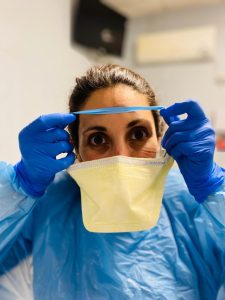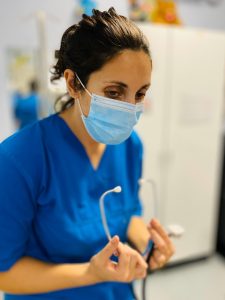14 Portugal, Cânia Torres
Portugal
Portugal is a country located on the Iberian Peninsula in Southwestern Europe. Its territory also includes the archipelagos of the Azores and Madeira. It has about 10 million inhabitants.
 My name is Cânia Torres, I am a Nurse Specialist in Child Health and Pediatrics, since 2005, in the Pediatric Ward of the University Hospital Center of São João (CHUSJ), located in Porto, Portugal. I am also a Professor at the Nursing School of Tâmega e Sousa (ESEnfTS), since 2018, where I teach students in the Undergraduate Nursing degree. I am also attending the final year of the Doctoral Program in Nursing Science at the Institute of Biomedical Sciences Abel Salazar (ICBAS), University of Porto. I am particularly dedicated to research in the area of evidence-based practice in nursing care provided to children and families.
My name is Cânia Torres, I am a Nurse Specialist in Child Health and Pediatrics, since 2005, in the Pediatric Ward of the University Hospital Center of São João (CHUSJ), located in Porto, Portugal. I am also a Professor at the Nursing School of Tâmega e Sousa (ESEnfTS), since 2018, where I teach students in the Undergraduate Nursing degree. I am also attending the final year of the Doctoral Program in Nursing Science at the Institute of Biomedical Sciences Abel Salazar (ICBAS), University of Porto. I am particularly dedicated to research in the area of evidence-based practice in nursing care provided to children and families.
The Covid-19 pandemic had an impact and brought very relevant changes in both aspects of my professional life. As a pediatric nurse, I work in a service that is characterized by the provision of highly quality care to sick or critically ill children and adolescents, which made the pandemic day-to-day even more complex and challenging. There was a need to reorganize the physical space and the nursing teams, with the creation of the “pediatric-Vovid ward”. In this change, the bustle of the corridors and the conversations between families, mixed with tears and smiles, so characteristic of this service, almost no longer existed. Even the “clown doctors” who used to bring life and joy to the hospital disappeared. From one day to the next everything changed, the silence of the corridors was strange, the doors of the wards were closed and the way we communicated with the family had to be readjusted.
I had to care for healthy newborns, children of Covid positive mothers, deprived immediately after birth of the physical presence of their parents. The reality was difficult, as these parents were in their homes, but without their children, until the negative test result came in. Thus, the newborns would remain in the pediatric ward for weeks, until the expected reunion! To allow these families, victims of the pandemic, to follow their newborns’ first days even from a distance, video calls were used. These were made several times a day and at special times, such as bathing, feeding, or sleeping. The care I provided had to be methodically planned, because I needed to set aside some time to virtually “reunite” the newborn with her/his parents.
In the course of this pandemic I found new ways to communicate. I communicated through my eyes, which got smaller and brighter when I smiled, behind the mask that hid my face. I communicated in the hug made difficult and camouflaged by the layers of personal protective equipment. I communicated in the empathetic and protective gesture, towards children and families whose lives were in suspense. I communicated, through my photo pasted on my equipment, so that they could know my face. I communicated and allowed them to communicate through technology.
I lived through this pandemic as part of a magical team, which, in the face of something so dark, rose above adversity. We were science, knowledge and wisdom, in wise hands, and hope for many of those we touched. Today, I am grateful to those who are and have been with me, to the children and families, for it was in the storm, in truly winding times that I had the privilege of “touching” the lives of others and being “touched” in a unique way.
Even today, technologies continue in the daily lives of nurses and families, bringing us closer together when it is not possible for us to be there physically. The families of some of the newborns I mentioned above keep in touch with pediatric team, sharing through videos or photos the most remarkable moments of their children’s development.
In Portuguese:
O meu nome é Cânia Torres, sou Enfermeira Especialista em Saúde Infantil e Pediátrica, desde 2005, na Ala Pediátrica do Centro Hospitalar Universitário de São João (CHUSJ), situado no Porto, Portugal. Sou também Professora na Escola Superior de Enfermagem do Tâmega e Sousa (ESEnfTS), desde 2018, onde leciono aos alunos do curso de Licenciatura em Enfermagem. Encontro-me ainda a frequentar o último ano do Programa Doutoral em Ciências de Enfermagem no Instituto de Ciências Biomédicas Abel Salazar (ICBAS), Universidade do Porto. Dedico-me particularmente à investigação na área da prática baseada na evidência nos cuidados de enfermagem prestados à criança e família.
A pandemia Covid-19 teve impacto e trouxe mudanças muito relevantes, nas duas vertentes da minha vida profissional. Como enfermeira pediatra, exerço funções num serviço que se caracteriza pela prestação de cuidados altamente qualificada às crianças e adolescentes doentes ou gravemente doentes, o que tornou o dia a dia pandémico ainda mais complexo e desafiante. Existiu uma necessidade de reorganização dos espaços físicos e das equipas de enfermagem, com a criação da “ala pediátrica-covid”. Nesta mudança a azáfama dos corredores e as conversas entre famílias, misturadas com choros e sorrisos, tão característico deste serviço, quase já não existia. Até os “doutores palhaços” que traziam vida e alegria ao hospital, desapareceram. De um dia para o outro tudo mudou, o silêncio dos corredores era estranho, as portas das enfermarias imponham-se fechadas e a forma como comunicávamos com a família teve de ser reajustada.
Fui enfermeira e cuidadora de recém-nascidos saudáveis, filhos de mães covid positivo, privados imediatamente após o parto da presença física dos seus pais. A realidade era difícil, pois estes pais estavam em suas casas, mas sem os seus filhos, até o resultado negativo do teste chegar. Assim, os recém-nascidos iam permanecendo durante semanas no internamento pediátrico, até ao esperado reencontro! Para permitir a estas famílias, vítimas da pandemia, que mesmo à distância acompanhassem os primeiros dias dos seus recém-nascidos, recorreu-se à vídeo-chamada. Eram realizadas várias vezes por dia e em momentos especiais, como o do banho, alimentação ou sono. A gestão dos cuidados que prestava tinha de ser metodicamente planeada, porque precisava disponibilizar algum tempo para “reunir” virtualmente o RN com os seus pais.
No decorrer desta pandemia (re)encontrei novas formas de comunicar. Comuniquei através do olhar, que ficava mais pequeno e brilhantes quando sorria, por trás da máscara que escondia o rosto. Comuniquei no abraço dificultado e camuflado pelas camadas dos equipamentos de proteção individual. Comuniquei no gesto empático e protetor, para com crianças e famílias cuja vida estava em suspenso. Comuniquei, através da minha foto colada na bata, para que conhecessem o meu rosto. Comuniquei e permiti que comunicassem através da tecnologia.
Vivi esta pandemia integrada numa equipa mágica, que perante algo tão sombrio se agigantou nas adversidades. Fomos ciência, conhecimento e sabedoria, em mãos sábias e de esperança para muitos dos que tocávamos. Hoje, sou grata aos que comigo estão e estiveram, às crianças e famílias, pois foi na tempestade, em tempos verdadeiramente sinuosos que tive o privilégio de “tocar” as vidas alheias e ser “tocada” de forma única.
Ainda hoje as tecnologias continuam no dia-a-dia dos enfermeiros e destas famílias, aproximando quando não é possível estarmos fisicamente. As famílias de alguns RNs que acima vos falei, mantém o contacto com a equipa de pediatria, partilhando por vídeos ou fotos os momentos mais marcantes dos desenvolvimentos dos seus filhos.

Additional Information About Nursing in Portugal
The National Health Service (NHS) was created in 1979 and encompasses structures to ensure Universal Coverage of Health Care at different levels of prevention: primary, secondary and tertiary. There are about 78,000 nurses, a ratio of 7.8 nurses per 1000 population. Portuguese nurses undergo rigorous education and training, completing a 4 years bachelor’s degree in nursing before entering the workforce. The nursing education curriculum emphasizes a holistic approach to patient care, focusing on evidence-based practice, clinical skills development, and interprofessional collaboration. Nurses can pursue further education through Master and Doctoral Degree in Nursing Science and/or other allied sciences.
Once qualified, Portuguese nurses work in a variety of healthcare settings, including hospitals, long-term care facilities, and community health services.
Media Attributions
- Cania Torres 1-1
- Cania Torres 2-1
